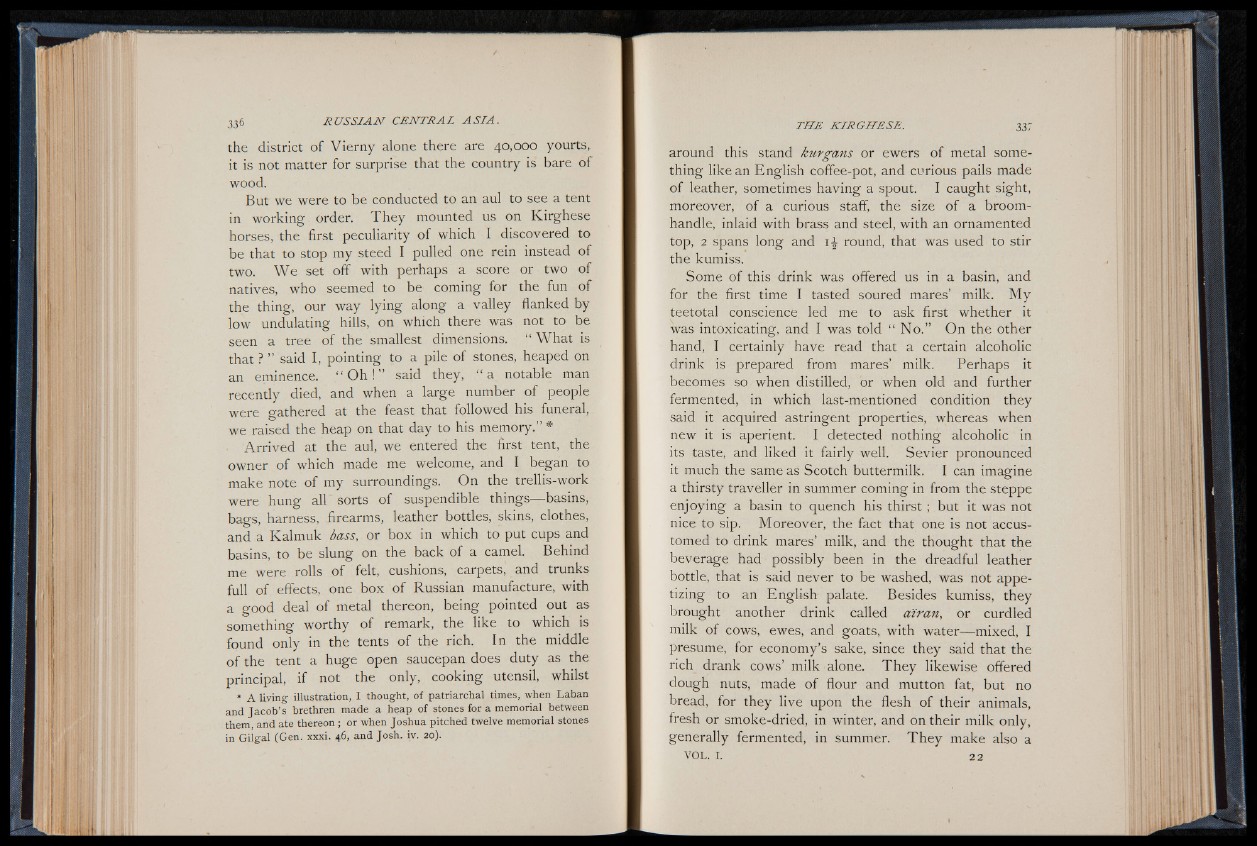
the district of Vierny alone there are 40,000 yourts,
it is not matter for surprise that the country is bare o f
wood.
But we were to be conducted to an aul to see a tent
in working order. They mounted us on Kirghese
horses, the first peculiarity of which I discovered to
be that to stop my steed I pulled one rein instead of
two. We set off with perhaps a score or two of
natives, who seemed to be coming for the fun of
the thing, our way lying along a valley flanked by
low undulating hills, on which there was not to be
seen a tree of the smallest dimensions. “ What is
that ? ” said I, pointing to a pile of stones, heaped on
an eminence. “ O h ! ” said they, “ a notable man
recently died, and when a large number of people
were gathered at the feast that followed his funeral,
we raised the heap on that day to his memory.” *
Arrived at the aul, we entered the first tent, the
owner of which made me welcome, and I began to
make note of my surroundings. On the trellis-work
were hung all sorts of suspendible things— basins,
bags, harness, firearms, leather bottles, skins, clothes,
and a Kalmuk bass, or box in which to put cups and
basins, to be slung on the back of a camel. Behind
me were rolls of felt, cushions, carpets,' and trunks
full of effects, one box of Russian manufacture, with
a good deal of metal thereon, being pointed out as
something worthy of remark, the like to which is
found only in the tents of the rich. In the middle
of the tent a huge open saucepan does duty as the
principal, if not the only, cooking utensil, whilst
* A living illustration, I thought, of patriarchal times, when Laban
and Jacob’ s brethren made a heap of stones for a memorial between
them, and ate thereon; or when Joshua pitched twelve memorial stones
in Gilgal (Gen. xxxi. 46, and Josh. iv. 20).
around this stand kurgans or ewers of metal something
like an English coffee-pot, and curious pails made
of leather, sometimes having a spout. I caught sight,
moreover, of a curious staff, the size of a broom-
handle, inlaid with brass and steel, with an ornamented
top, 2 spans long and i£ round, that was used to stir
the kumiss.
Some of this drink was offered us in a basin, and
for the first time I tasted soured mares’ milk. My
teetotal conscience led me to ask first whether it
was intoxicating, and I was told “ No.” On the other
hand, I certainly have read that a certain alcoholic
drink is prepared from mares’ milk. Perhaps it
becomes so when distilled, or when old and further
fermented, in which last-mentioned condition they
said it acquired astringent properties, whereas when
new it is aperient. I detected nothing alcoholic in
its taste, and liked it fairly well. Sevier pronounced
it much the same as Scotch buttermilk. I can imagine
a thirsty traveller in summer coming in from the steppe
enjoying a basin to quench his thirst ; but it was not
nice to sip. Moreover, the fact that one is not accustomed
to drink mares’ milk, and the thought that the
beverage had possibly been in the dreadful leather
bottle, that is said never to be washed, was not appetizing
to an English palate. Besides kumiss, they
brought another drink called airan, or curdled
milk of cows, ewes, and goats, with water— mixed, I
presume, for economy’s sake, since they said that the
rich drank cows’ milk alone. They likewise offered
dough nuts, made of flour and mutton fat, but no
bread, for they live upon the flesh of their animals,
fresh or smoke-dried, in winter, and on their milk only,
generally fermented, in summer. They make also a
v o l . 1. 2 2